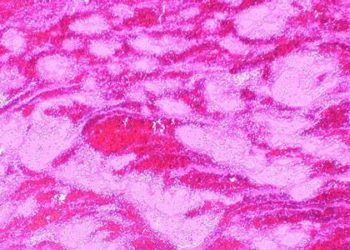Current therapies ineffective at reducing epistaxis in hereditary hemorrhagic telangiectasia
1. No intranasal drug treatment (bevacizumab, estriol, or tranexamic acid) significantly reduced epistaxis duration compared to placebo.
2. There were no significant differences between these three drugs in terms of hemoglobin level, ferritin level, treatment failure, need for transfusion, or emergency department visits.
Evidence Rating Level: 1 (Excellent)
Study Rundown: Patients with hereditary hemorrhagic telangiectasia (HHT) develop friable telangiectasias of the nasal mucosa which often bleed, leading to a lower quality of life. Though there are several current systemic therapies for epistaxis in HHT, they are associated with significant side effects and of an unproven efficacy. Thus, this study sought to compare the effectiveness and safety of three topical, intranasal therapies, bevacizumab, estriol, and tranexamic acid.
A total of 121 patients received twice-daily intranasal doses of either bevacizumab, estriol, tranexamic acid, or placebo for 12 weeks and frequency of epistaxis was tracked. The authors found that, while all medications were well tolerated, there was no difference in efficacy among any of the therapies compared to placebo. There was also no difference in the secondary outcome measures of serum hemoglobin or ferritin, treatment failure, need for transfusion, or emergency department visits. While this study is disappointing in terms of finding a treatment effect in a patient population sorely in need of new treatment approaches, the lack of intranasal efficacy may be due, in part, to poor absorption secondary to scab formation and other abnormalities of the nasal mucosa. Further work is warranted.
Click here to read the study in JAMA
Relevant Reading: Morphology and Distribution of Nasal Telangiectasia in HHT-Patients with Epistaxis
In-Depth [randomized controlled study]: The North American Study of Epistaxis in HHT (NOSE) was a multicenter, double-blind, randomized phase 2 trial conducted between 2011 and 2014. The trial compared the effectiveness of three intranasal medications: 1) bevacizumab (recombinant humanized antibody directed against vascular endothelial growth factor that may attenuate angiogenesis), 2) estriol (which may promote squamous metaplasia of the nasal mucosa), and 3) tranexamic acid (which stabilizes blood clots through inhibition of fibrinolysis). The median weekly number of nose bleed episodes was 7.0 (IQR 4.5-10.5) for patients on bevacizumab, 8.0 (IQR 4.0-12.0) for patients on estriol, 7.5 (IQR 3.0-11.0) for patients on tranexamic acid, and 8.0 (IQR 3.0-14.0) for patients on placebo. All of the treatment and placebo groups had a significant improvement in the Epistaxis Severity Score at weeks 12 and 24 (p < 0.001 for time effect).
Image: CC/Wiki
©2016 2 Minute Medicine, Inc. All rights reserved. No works may be reproduced without expressed written consent from 2 Minute Medicine, Inc. Inquire about licensing here. No article should be construed as medical advice and is not intended as such by the authors or by 2 Minute Medicine, Inc.



![Adverse pregnancy outcomes associated with thrombophilias [Classics Series]](https://www.2minutemedicine.com/wp-content/uploads/2015/07/Classics-2-Minute-Medicine-e1436017941513-75x75.png)
